2 第2讲 词的增补与省略1
4-增词法和省略法.ppt.Convertor

英汉翻译中的增词与减词1、增补词语Amplification英汉两种语言,由于表达方式不同,翻译时不仅可以将词类转译,又可以在词量上进行增减。
按照英语的表达方式,有些词是有其意而无其形的,这种情况在译成汉语时就要增补一些词语,使之符合汉语的表达方式,从而更加通顺地表达原文的思想内容。
当然这种增补不能无中生有,凭空杜撰,而要有一定的根据。
Studies serve for delight, for ornament and, for ability.1.读书服务于乐趣,服务于文采,服务于才干。
2. 读书可以使人从中获得乐趣,可以给人添加文采,可以使人增加才干。
3. 读书足以怡情,足以博采,足以长才。
(王佐良)(1) 增补潜在词I began the book yesterday. 昨天我开始读(写)这本书。
The new American Secretary of State has proposed a world conference on food supplies. 美国新任国务卿建议(召开)世界食品资源问题会议。
(2) 增补省略的词1. What an idea?2. What a day!3. “I will make a man of him.”“我要把他培养成一个堂堂的男子汉。
4. Reading makes a full man; conference a ready man; writing an exact man.读书使人充实,讨论使人机智,写作使人准确。
5. Such is war: to the victor, the spoils; to the defeated, the costs.战争就是如此:胜利者获得战利品,战败者遭受损失。
(3) 不及物动词增补宾语1. He never drinks before driving. 他开车前从不喝酒。
2. Before liberation, his mother lived on washing. 解放前,他妈妈靠洗衣为生。
英文翻译技巧之增词法与减词法

英文翻译技巧之增词法与减词法英汉两种语言,由于表达方式不尽相同,翻译时既可能要将词类加以转换,又可能要在词量上加以增减。
增词法与减词法在英汉互译中运用相当广泛,但无论增词还是减词,增减的是词,不是意。
一、增词法所谓增词法,就是在翻译时,为了使译文合乎汉语的习惯和表达规律,为了使意思更加明确,从意义、修辞和句法上需要在译文中适当增添一些虽无其词而有其意的词。
增词译法不是凭空想象,必须增之有道,补之有理。
必要的增词对一个句子起着画龙点睛的作用,准确、通顺和完整地表达原文的内容,避免语义模糊。
例1:Packing together with packaging is designed not only as a form of protection but also a form to facilitate handling, storage, to prevent pilferage and what's more to help promote the sales.译文:包装和包装方法不仅仅是为了保护商品,也是为了便利搬运和库存、防止盗窃,更重要的是,有助于促销。
解析:“protection”此处译作“保护商品”,加了“商品”两字,显然比译作“保护”更好。
1.增加原文中省略的部分英语中有省略现象,译为汉语时往往要根据句法需要补出英文中省略的成分,主要包括回答中的省略、动词的省略及比较句中的省略等;另外,为表示态度、逻辑关系等,也需要加词。
(1)增补回答句中省略的词语1例2:—He doesn’t know, does he?—Yes, he does.译文:——他不知道吧?——不,他知道。
例3:—Did you enjoy your time in Beijing?—Yes, I did.译文:——你在北京过得愉快吗?——是的,我过得很愉快。
(2)增补并列结构中省略的词语例4:On average, the economy performs less well in a president's second term than in his first.That pattern probably does not apply to Mr Obama. Since his first term was so difficult, the next, by rights, ought to be better.译文:一般来说,美国总统第二个任期内的经济不如第一任期。
第二节 增补与省略

AfterAfter-class exercises: Put the following sentences into Chinese, using the technique of amplification. 1.Reading makes a full man; conference a ready man; and writing an exact man. 2.Courage in excess becomes foolhardiness, affection weakness, thrift avarice. 3.We won’t retreat, we never have and never will.
The price of the products should be set according to the price in the international market. It should be fixed by the two parties at a level that will bring profit to both. 产品价格应该根据国际市场的价格,由 双方共同商定,须照顾到双方的共同利 益。 Part-time waitress applicants who had worked at a job would receive preference over those who had not. 应聘业余女服务员者,有工作经验者优 先。
4. She would spend hours dressing herself in fine clothes, and brushing her black hair. Then she would stand by the mirror and admire herself. 她总是要花好几个小时为自己盛装打扮, 梳理她乌黑的头发。之后她还常常照着 镜子自我欣赏一番。 5. Man, was, is and always will be trying to improve his living conditions. 人类过去、现在而且将来总是在尽力改 善生活条件。
第二讲增词法和省略法PPT课件
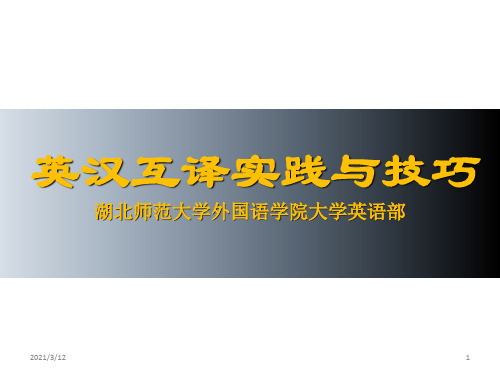
2021/3/12
5
Ⅰ. Amplification in English-Chinese
Translation增词法在汉英翻译中的运用
搭配性增词
增词法
结构性增词
解释性增词
2021/3/12
6
搭配性增词
定义
搭配性增词的产生是因为英语和汉语词类不对称所致。如 汉语中存在的量词、助词和语气词等是英语中没有的,在 翻译过程中要根据情况添加。这类增词不影响内容,主要 考虑搭配习惯,故称为搭配性增词。
• Something about music and a coffee break in the afternoon. • 像放背景音乐啦,下午安排工间喝咖啡休息时间什么的。
2021/3/12
9
3) Supplying Words of Generalization 增加概括词
• Sino-British links have multiplied—— political, commercial, educational, cultural, defense, science and technology.
• 中英两国在政治、商务、教育、文化、国防和科技等领域的 交往成倍地增加。
• The thesis summed up the new achievements made in electronic computers, artificial satellites and rockets.
• 论文总结了电子计算机、人造卫星和火箭三方面的成就。 • The principal functions that may be performed by vacuum
一棵树
• a flower 一朵花
第2讲 词的增补

3. 作宾语的代词
请原谅,打断你一下。 Excuse me for interrupting you. you 把这些故事看完以后,用你自己的话讲一遍。 把这些故事看完以后 用你自己的话讲 遍 After you have read these stories, tell them in your own words.
(4)冠词
(1) 耳朵是用来听声音的器官,鼻子用来嗅气味ቤተ መጻሕፍቲ ባይዱ舌 头 来尝滋 头用来尝滋味。 The ear is the organ which is used for hearing. The nose is used for smelling , The tongue is used for tasting tasting. (2) 我们对问题要做全面的分析 才能解决得妥当 我们对问题要做全面的分析,才能解决得妥当。 We must make a comprehensive analysis of a problem before it can be properly solved.
人民犯了法,也要受处罚,也要坐班房,也有死 刑… When anyone among the people breaks the law, he too should be punished imprisoned or even sentenced punished, to death; … 过去我们已经多次讲过用民主方法解决人民内部 矛盾这个问题,并且在工作中基本上就是这样 做的,很多干部和人民都在实际上懂得这个问 做的 很多干部和人民都在实际上懂得这个问 题。 …many cadres and many other people … d d h l
乞巧
林杰(唐) 七夕今宵看碧宵, 宵看 宵 牵牛织女渡河桥。 家家乞巧望秋月, 家家乞巧望秋月 穿尽红丝几万条。
翻译技巧之增补与省略 ppt课件

ppt课件
32
②Before the adjectives
• This typewriter is indeed cheap and fine. 这部打字机真是物美价廉。
ppt课件
33
③After the abstract nouns
• Tense 紧张
tension 紧张局势
• arrogant 自满
arrogance 自满情绪
• mad 疯狂
madness 疯狂行为
• antagonistic 敌对 antagonism 敌对态度
ppt课件
35
• After all preparations were made, the plane took off.
ppt课件
12
(3) 省略表示时间的连接词
• John rose gloomily as the train stopped, for he was thinking of his ailing mother. 火车停了,约翰郁郁地站了起来,因为他 想起了病中的母亲。
ppt课件
13
4) 省略冠词
这些发展中国家,地大物博,人口众多。
ppt课件
18
• There was no snow, the leaves were gone from the trees, and the grass was dead.
天未下雪,但叶落草枯。
ppt课件
19
• University applicants who had worked at a job would receive preference over those who had not. 报考大学的人,有工作经验的优先录取。
第二节 增词法
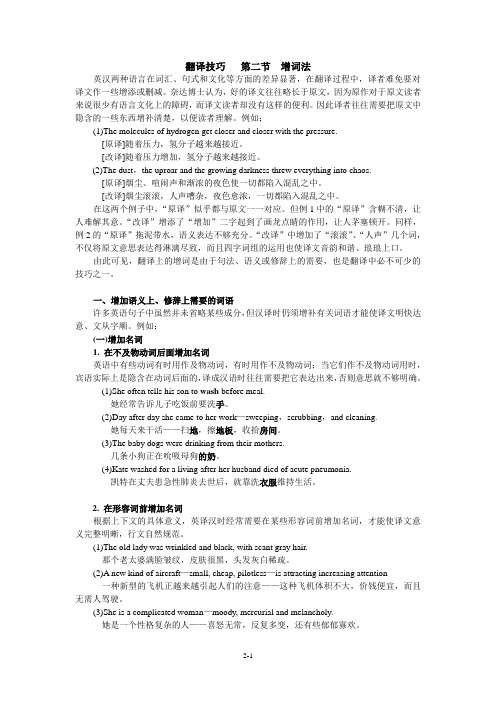
翻译技巧第二节增词法英汉两种语言在词汇、句式和文化等方面的差异显著,在翻译过程中,译者难免要对译文作一些增添或删减。
奈达博士认为,好的译文往往略长于原文,因为原作对于原文读者来说很少有语言文化上的障碍,而译文读者却没有这样的便利。
因此译者往往需要把原文中隐含的一些东西增补清楚,以便读者理解。
例如:(1)The molecules of hydrogen get closer and closer with the pressure.[原译]随着压力,氢分子越来越接近。
[改译]随着压力增加,氢分子越来越接近。
(2)The dust,the uproar and the growing darkness threw everything into chaos.[原译]烟尘、喧闹声和渐浓的夜色使一切都陷入混乱之中。
[改译]烟尘滚滚,人声嘈杂,夜色愈浓,一切都陷入混乱之中。
在这两个例子中,“原译”似乎都与原文一一对应。
但例l中的“原译”含糊不清,让人难解其意。
“改译”增添了“增加”二字起到了画龙点睛的作用,让人茅塞顿开。
同样,例2的“原译”拖泥带水,语义表达不够充分。
“改译”中增加了“滚滚”、“人声”几个词,不仅将原文意思表达得淋漓尽致,而且四字词组的运用也使译文音韵和谐、琅琅上口。
由此可见,翻译上的增词是由于句法、语义或修辞上的需要,也是翻译中必不可少的技巧之一。
一、增加语义上、修辞上需要的词语许多英语句子中虽然并未省略某些成分,但汉译时仍须增补有关词语才能使译文明快达意、文从字顺。
例如:(一)增加名词1. 在不及物动词后面增加名词英语中有些动词有时用作及物动词,有时用作不及物动词;当它们作不及物动词用时,宾语实际上是隐含在动词后面的,译成汉语时往往需要把它表达出来,否则意思就不够明确。
(1)She often tells his son to wash before meal.她经常告诉儿子吃饭前要洗手。
商务英语翻译—增词与省略
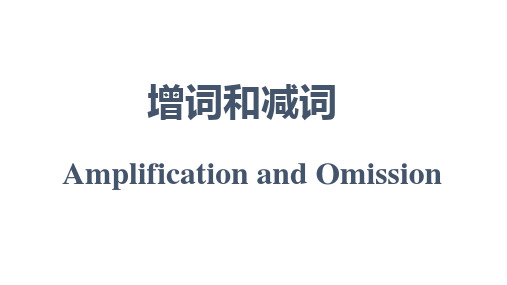
中国同世界各国各地区的经济技术交流与合作广泛 开展。 China has engaged in extensive economic and technological exchanges and cooperation with other countries and regions.
二、原文中表示范畴的词
We might not make any headway with your offer.
本公司接受贵公司的报盘,但要求贵公司把装运期提前两个月。
We accept your offer, but demand that you advance the shipment by two months.
话不说。
He shrugged his shoulders, shook his head, cast up his eyes, but said nothing.
4.增加连词或关系代词
汉语中的词,词组和句子之间的关系往往通过上下文或语序来表
示,较少用连词或关系代词.而英语通常需要用连词关系代词来表明
增词和减词
Amplification and Omission
一、增词法(Amplification)
增词(译)法就是指在翻译时按照句法上的需要在
译文中增加一些原文中虽无但有其意的词。 增译的目的是为了更加忠实通顺地表达原文的内容,
而决不是无中生有地随意增加。
1.增补主语
汉语里无主语的句子相当多,汉译英时 常常要根据上下文的意思选择适当的代 词或名词补出主语。
之间的逻辑关系.因此汉译英时增补的情况很多.例:
酒令智昏
物极必反
• When • Once
wine is in, wit is out.
翻译技巧之增补与省略 ppt课件

这些发展中国家,地大物博,人口众多。
ppt课件
18
• There was no snow, the leaves were gone from the trees, and the grass was dead.
• A teacher should have patience in his work. 当教员的应当有耐心。
• The horse is a useful animal. 马是有益的动物。
ppt课件
14
5) 省略前置词
(1)省略表示时间的前置词
• The People’s Republic of China was founded in 1949. 一九四九年中华人民共和国成立。
ppt课件
12
(3) 省略表示时间的连接词
• John rose gloomily as the train stopped, for he was thinking of his ailing mother. 火车停了,约翰郁郁地站了起来,因为他 想起了病中的母亲。
பைடு நூலகம்
ppt课件
13
4) 省略冠词
raining cats and dogs. 外面一团漆黑,大雨倾盆。 • He glanced at his watch; it was 7:15. 他一看表,是七点一刻了。
ppt课件
9
(2) 强势用it
• It was only then that I began to have doubts whether my story would ever be told. 只是在这个时候,我才开始怀疑,我的经 历究竟能不能公诸于众呢!
ppt课件
翻译的增补与省略
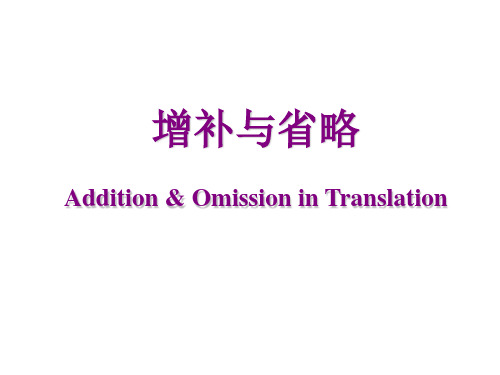
35
返回章重点 退出
1. 8 根据语气增词
出于行文考虑,英译汉时增加一些汉语的 语气助词、强调性副词或重复词汇,使译文明 白流畅,这种增词译法实际上是一种结构增词。
例1:Good news, friends!
【译文】朋友们,报告大家一个好消息!
36
返回章重点 退出
例2:What we saw was indeed a new China. A country of welldressed, clean, healthy, and happy people.
如:—What kind of money do girls like the most ?
—Matrimony.
若译作:“——姑娘们喜欢什么样的钱?” “——婚姻”。
运用增补译法进行改译: “——姑娘们喜欢什么样的钱,美元还是日元?” “——良缘。”
6
返回章重点 退出
不管增词还是减词,其原则 是增词不增意,减词不减意。其 目的是使译文更加通顺流畅,明 白易懂。
住宿→住宿 问题
连接→连接 部分
饱和→饱和 状态
准备→准备 工作
补救→补救 措施
修改→修改 方案
15
返回章重点 退出
1. 3 译抽象名词时增加 另一个抽象名词
在抽象名词后面跟上另一个抽象名词来 加强语气,强调说明前一个名词,两个名词 互相解释。 例1:Use your intelligence, and
第二节 增补与省略
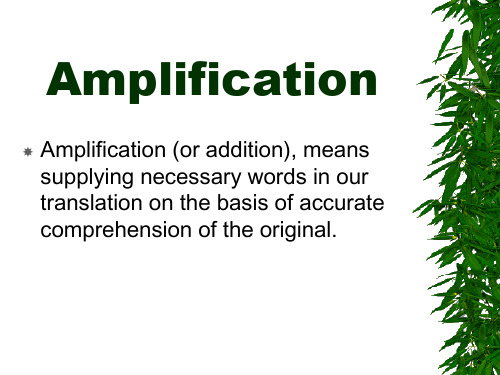
Amplification by Supplying Words Omitted in the Original 增加原文中省略的成分
1.Matter can be changed intor. 2.The Italians are wise before the deed, the Germans in the deed, the French after the deed.
灵活运用
Standing as it does on a high hill, the church commands a beautiful view. We take this opportunity to inform you that we are now in a position to make prompt shipment of the merchandise. Suitable for men, women and children
4. Amplification for Purposes of
Coherence or Rhetoric
This typewriter is indeed cheap and fine. 2.Theory is something, but practice is everything. 3. A scientist constantly tried to defeat his hypotheses, his theories and his conclusion.
3. Amplification to meet the need of grammar
1. There were rows of houses which he had never seen before. 2. If I were there! 3. The lion is the king of animals.
翻译技巧之增补与省略

contents
目录
• 增补技巧 • 省略技巧 • 增补与省略的对比与选择 • 增补与省略的实际应用 • 案例分析
01
CATALOGUE
增补技巧
语义增补
总结词
为了弥补原文中隐含的信息,使译文更加完整和流畅。
详细描述
在翻译过程中,有时候原文中某些信息是隐含的或未明确表达的,为了确保译 文的完整性和准确性,译者需要适当增补这些信息,使译文更加自然流畅。
商务翻译中的增补与省略
在商务翻译中,增补与省略的技巧同样重要。为了确保信 息的准确传递,商务翻译中通常需要增补一些重要细节, 如数据、时间、地点等。同时,对于一些无关紧要的细节 或商业机密,可以进行适当的省略。
在商务翻译中,增补的内容通常包括合同条款、产品规格 、市场分析等,而省略的部分则是一些无关紧要的细节或 商业机密。
增补与省略综合运用案例
总结词
在实际的翻译过程中,增补和省略技巧常常是综合运 用的,需要根据具体情况进行灵活处理。
详细描述
在翻译过程中,有时需要根据上下文和语境进行适当 的增补和省略,以使译文更加准确、流畅和易于理解 。例如,在翻译“他喜欢读书,经常一整天都坐在书 桌前”时,可以综合运用增补和省略技巧,翻译为“ 他热爱阅读,经常一整天沉浸在书海中”,既省略了 “坐在书桌前”这一表述,又通过增补“沉浸在书海 中”来补充说明他对阅读的热爱和投入。
详细描述
在翻译过程中,有时候原文的逻辑关系不够明确或存在跳跃,为了确保译文的逻 辑性和连贯性,译者需要进行适当的逻辑增补,补充或调整原文中的逻辑关系, 使译文更加流畅易懂。
02
CATALOGUE
省略技巧
非关键信息省略
描述性细节省略
汉英翻译中的增补与省略
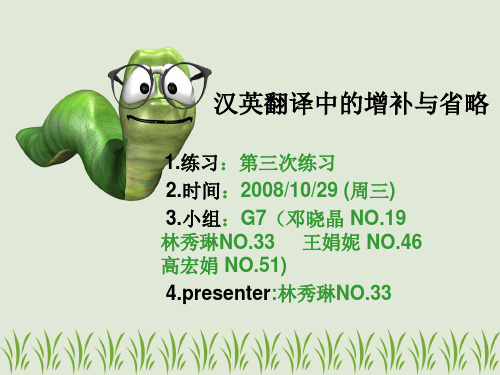
时态错误
1.All over my garden, I’ve plant nothing but roses → I’ve planted 2.However, it is very strange that every visitor is so cautious →was
语法错误
• 1.I knew that she was very like the plants → I know that she loved the flowers and plants very much / I know her to be a lover of flowers and plants • 分析: “be like” 的意思是“相像” ,而 分析: 的意思是“相像” 同学的译文却成了她和花草很像。 同学的译文却成了她和花草很像。 • 再者 “ she was very like ” 同学采用字 再者, 对字的直译犯了中式英语的错误 • 而“花花草草” 同学只译出 “plants” 花花草草”
1.挖掘含义 挖掘含义
汉语中暗含而无需明言的词语, 汉语中暗含而无需明言的词语,在 译文中难以再现。在此情况下, 译文中难以再现。在此情况下,需 要增加用词才能使译文语义明确。
(《汉英等效翻译》 管新平 何志平) 何志平) 汉英等效翻译》
例一
• 感冒可以通过人的手进行传染。 感冒可以通过人的手进行传染。
例二
• 我在花园里种满了芬芳的玫瑰花,远远望去,像是一片燃 我在花园里种满了芬芳的玫瑰花,远远望去, 烧的晚霞 (《汉英比较翻译教程练习》 魏志成 编著) • (同学译文):I have grown many fragrant roses in 同学译文) my garden, looked from a distance, it seemed that there was a sunset glow burning flamingly. • (参考译文):All over my garden I’ve planted nothing 参考译文) but roses, fragrant and ---if looked from afar---ablaze with color like sunset clouds. • 【解析】在这个句子中,根据前后句子的含义判断,远远 解析】在这个句子中,根据前后句子的含义判断, 望去是表示一种条件, 望去是表示一种条件,所以处理句子时如果在 looked 前 加上if , 这样翻译表意比较明确。还有后一个句子,根据 加上 这样翻译表意比较明确。还有后一个句子, 前后意思判断,说的是玫瑰花的颜色像晚霞燃烧时的颜色, 前后意思判断,说的是玫瑰花的颜色像晚霞燃烧时的颜色, 而不是玫瑰像晚霞,所以补出color 这个词 而不是玫瑰像晚霞,所以补出
英汉翻译中的增词法和减词法
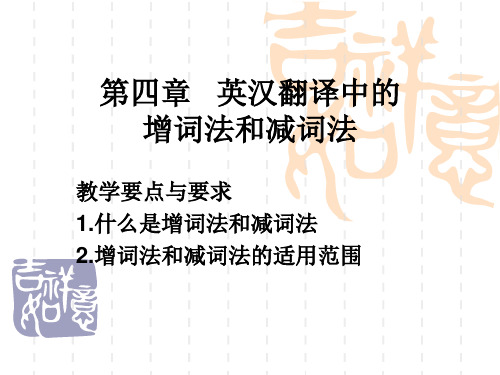
This great scientist was born in New England.
这位伟大的科学家出生在美国东北部的 新英格兰。
EX. 增加背景知识文化而增词
The blond boy quickly crossed himself.
▪ 导致合并不断增加的另一个因素是股票市场的空 前繁荣。股票市场的空前繁荣使得各家公司可以 依赖其上涨的股票价格去资助各种大规模的购进。
2.4 因语序变化而加词
▪ 由于英语国家惯用被动结构的语序,而我们 中国人惯用主动句,因而,在翻译中经常要增 加主语,使之变为主动语态,以适应我们的语 言习惯。例如:
因表达清晰自然之需而增词
❖ As to direct and indirect exporting, which approach is best depends on such factors as the company’s size, its export volume, the number of foreign countries involved, the investment required to support the operation, the profit potential, the risk present, and the desires of the overseas buyers.
▪ These drills want sharpening. ▪ 这些钻头需要磨一磨。
EX. 因语法需要而增词
▪ It is on one of these occasions that I met the Cartwrights. I was staying with a man named Gaze who was head of the police and he came into the billiardroom, where I was sitting, and asked me if I would make up a four at a bridgetable.
增补与省略
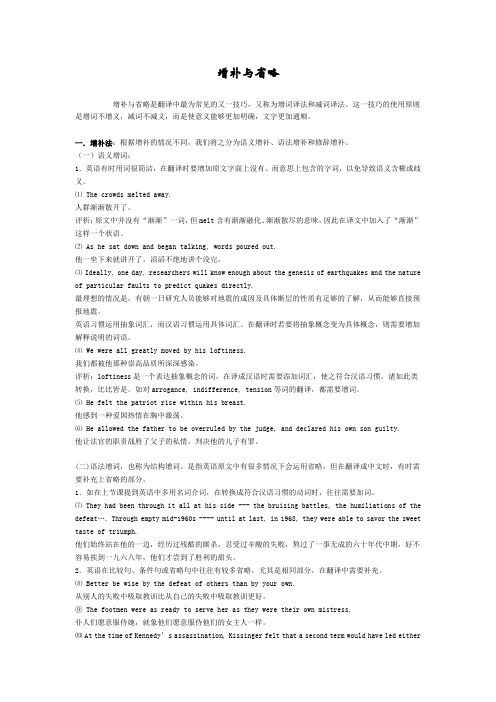
增补与省略增补与省略是翻译中最为常见的又一技巧,又称为增词译法和减词译法。
这一技巧的使用原则是增词不增义,减词不减义,而是使意义能够更加明确,文字更加通顺。
一.增补法:根据增补的情况不同,我们将之分为语义增补、语法增补和修辞增补。
(一)语义增词:1.英语有时用词很简洁,在翻译时要增加原文字面上没有、而意思上包含的字词,以免导致语义含糊或歧义。
⑴ The crowds melted away.人群渐渐散开了。
评析:原文中并没有“渐渐”一词,但melt含有渐渐融化、渐渐散尽的意味,因此在译文中加入了“渐渐”这样一个状语。
⑵ As he sat down and began talking, words poured out.他一坐下来就讲开了,滔滔不绝地讲个没完。
⑶ Ideally, one day, researchers will know enough about the genesis of earthquakes and the nature of particular faults to predict quakes directly.最理想的情况是,有朝一日研究人员能够对地震的成因及具体断层的性质有足够的了解,从而能够直接预报地震。
英语习惯运用抽象词汇,而汉语习惯运用具体词汇。
在翻译时若要将抽象概念变为具体概念,则需要增加解释说明的词语。
⑷ We were all greatly moved by his loftiness.我们都被他那种崇高品质所深深感染。
评析:loftiness是一个表达抽象概念的词,在译成汉语时需要添加词汇,使之符合汉语习惯,诸如此类转换,比比皆是。
如对arrogance, indifference, tension等词的翻译,都需要增词。
⑸ He felt the patriot rise within his breast.他感到一种爱国热情在胸中激荡。
⑹ He allowed the father to be overruled by the judge, and declared his own son guilty.他让法官的职责战胜了父子的私情,判决他的儿子有罪。
第三节 词的增加与减省
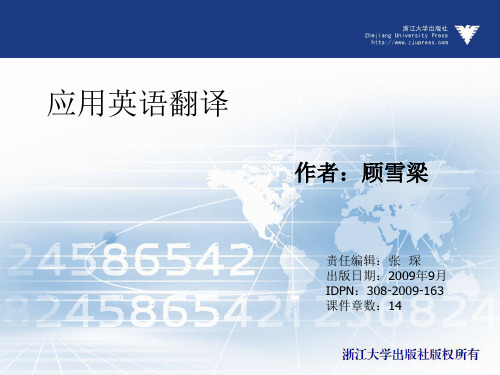
I.为了语法上的需要而增词
3.英语可数名词翻译的增词
英语的可 数名词有单复 数之别,汉语 则没有。英译 时常常有必要 通过增加合适 的量词和数词 来表达出原文 的单复数概念。
1) 增加量词
2)
增加表示名词复数的词
I.为了语法上的需要而增词
3.英语可数名词翻译的增词 1)增加量词 1.I saw bubbles rising from under the water. 我看见一个个水泡从水下升起。 2.The mountains began to throw their long shadows over the valley. 群山在山谷里开始投下长长的影子。 3.Note that the words ―velocity‖ and ―speed‖ require explanation. 请注意,“速度”和“速率”这两个词需要加以 解释。 Examples
Examples
II.为了意义表达清晰而增词
2. 增加动词 Examples
4 . When I came to , I was in the water, swimming automatically, though I was about two thirds drowned. 当我清醒过来时,发觉自己在水里,虽然浸得半 死,却本能地浮着。 5.You cannot build a ship, a house, or a machine tool if you do not know how to make or read a design. 如果不懂制图或看不懂图纸,就不能造船、盖房 子或制造机床。
I.为了语法上的需要而增词
3.英语可数名词翻译的增词 2)增加表示名词复数的词 1.The lion is the king of animals. 狮是百兽之王。 2.We have to face different problems. Examples
英语四级翻译解题技巧

一、翻译的标准严复:信、达、雅(faithfulness, expressiveness, eleganc e—忠实于原文;译文通顺易懂;译文展示出风采)二、汉译英常用方法和技巧与词有关的翻译方法包括:直译和意译词义的选择词的增补与省略词类转义法重复法正说反译法和反说正译法分句法和合句法直译和意译首先应当指出,直译不是死译,而是指基本保留原有句子结构,照字面意思翻译。
意译也不是胡译、乱译,而是在不损害原文内容和精神的前提下,为了表达的需要,对原文作相应的调整。
例原文:我们的朋友遍天下。
直译:Our friends are all over the world.意译:We have friends all over the world.直译以严格意义上的忠实为宗旨,意译则更多考虑英语的特点,更强调译文的效果,不求形式对应,只求语言在深层次中的对应。
总之,选择直译还是意译,应该根据文章具体需要而定,两种译法可以并用。
✧能直译则直译例原文:爱是耐心和善良;爱不是妒忌和吹嘘;爱不是傲慢和粗鲁。
译文:Love is patience and kindness; love is not jealous and boast; love is not arrogance and rudeness.原文:你们要八仙过海,各显其能,完成这项工作。
译文:You should display your special prowess like eight immortals ( in Chinese legend) crossing the sea, to fulfill this task.✧必须意译例原文:怕什么呢?死了张屠夫,还有李屠夫,人多得很。
直译:If Butcher Zhang dies, there’s Butcher Li yet.译文:What are you afraid of? He is not the only pebble on the beach.✧意译效果比直译好例原文:她怕碰一鼻子灰,话到了嘴边,又把它吞了下去。
Chapter 2 词的省略详细版.ppt

ChapterΒιβλιοθήκη 2 词的省略优选1
1.省略重复出现的词语
1. 1. 有时可将重复出现的词语抽取出 来合译为一个英语词汇或词组,这种 方法类似于数学中的“提取公因式”。 提取公因式不仅适用于外形完全相同 的词语,而且也可用于外形上不同但 在语义上相同或相近的词语。例如:
beautiful / put the flowers to shame
优选
7
4. 省略其意义已隐含在上下文其他 词语里的成分
有时候汉语原文本身并没有语义上的 不必要的重复,但在英语中可以找到 能包含两层意义的词汇。选用这样的 词汇可以使译文更为精炼。
优选
8
推动农产品生产、加工和销售的有机 结合。
优选
3
2. 对于原文中重复出现的词语也可 以采用代词来替换它以避免重复。
学习英语的方法和学习游泳的方法一 样,必须把实践放在第一位。
The way of learning the English language is the same as that of learning swimming: Practice must be put first.
的能力。
优选
10
1. He gets as much as he gives, winning honors not only for himself but also for his country.
2. To participate and win — that is the Olympic spirit.
5. We should develop rising and
high-tech industries as well as
- 1、下载文档前请自行甄别文档内容的完整性,平台不提供额外的编辑、内容补充、找答案等附加服务。
- 2、"仅部分预览"的文档,不可在线预览部分如存在完整性等问题,可反馈申请退款(可完整预览的文档不适用该条件!)。
- 3、如文档侵犯您的权益,请联系客服反馈,我们会尽快为您处理(人工客服工作时间:9:00-18:30)。
第二讲词的增补与省略
Amplification
Grammatical amplification
1. 眉头一皱,计上心来。
Knit your brows and you will hit upon a stratagem.
Amplification for precision of meanings
1. 我不爱喝饮料。
don’t like soft drinks.
Omission
Omission of repetitive words
1. “我没有疯—一点也没有疯!我要你说,我要你告诉他们!这是我与他们算账的最后机会。
”
No, I’m not mad, not in the least! And now it’s your turn to speak, and tell them all about it—it’s my last chance to get even with them all.
2. 我们应该分析问题,解决问题。
We should analyze and solve problems.
Omission of summary and category words
1. 他脸上的表情,他说话的音调,他的嘴巴,所有这一切都说明,他是一个诚实的人。
His facial expression, his accent and his mouth showed that he was an honest man.
2. 夫妻二人正在街上手拉手散步。
The couple is walking hand in hand in the street.
Omission for rhetorical purposes
1. 我们应广泛地普及科学文化知识。
We should popularize science and culture.
2. 我们缺乏调查研究客观实际状况的浓厚的气氛。
We are lacking in a climate of investigation and study of reality.
课堂练习
1.学生们天天带午饭到学校去吃。
2.耳朵是用来听声音的器官,鼻子是用来嗅气味,舌头是用来尝滋味。
3.要提倡顾全大局。
4.海外侨胞常说:“我们的新永远向着祖国”。
5.比他技术高明一点的人,他叫人家师傅。
6.这真是俗话说的,“旁观者清”。
7.这件事咱们回头再详谈。
8.他把事情一五一十地都给父母说了。
9.他一开口总是三句话不离本行。
10.新老干部要相互学习,相互帮助,取长补短。
11.昨天我没有进城,一来是因为天气不好,二来是因为我不舒服。
12.他们是多年的邻居,一旦分别,不免依依不舍。
参考答案
1 学生们天天带午饭到学校去吃。
The pupils take their lunches to school every day.
2 耳朵是用来听声音的器官,鼻子是用来嗅气味,舌头是用来尝滋味。
The ear is the organ which is used for hearing. The nose is used for smelling. The tongue is used for eating.
3 要提倡顾全大局。
We should advocate the spirit of taking the whole situation into consideration.
4 海外侨胞常说:“我们的新永远向着祖国”。
The overseas Chinese usually say “our hearts are always towards our motherland.” (have a strong yearning for, our motherland has a good grip on us overseas Chinese)
5 比他技术高明一点的人,他叫人家师傅。
Those whose technical level was higher than his own he addressed as “Masters.”
6 这真是俗话说的,“旁观者清”。
It is just as the proverbs goes, “The onlooker sees most of the game.” (the spectator is in a better position to judge)
7 这件事咱们回头再详谈。
We shall discuss it in detail when we meet again.
8 他把事情一五一十地都给父母说了。
He told his parents the whole story exactly as it had happened
9 他一开口总是三句话不离本行。
He can hardly open his mouth without talking shop.
10 新老干部要相互学习,相互帮助,取长补短。
Old and new cadres should learn from and help each other, to make up for each other’s deficiencies.
11 昨天我没有进城,一来是因为天气不好,二来是因为我不舒服。
I didn’t go to town yesterday both because of the nasty weather and the fact that I was not feeling well.
12 他们是多年的邻居,一旦分别,不免依依不舍。
After being good neighbours for years, they can’t bear to part from each other.。
